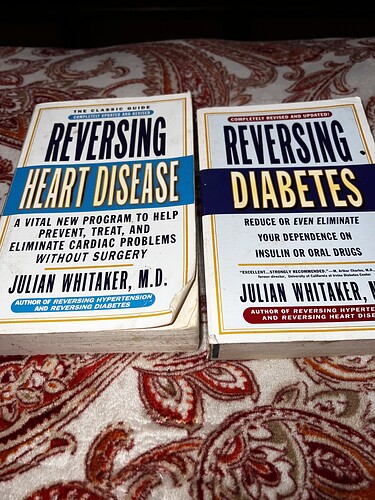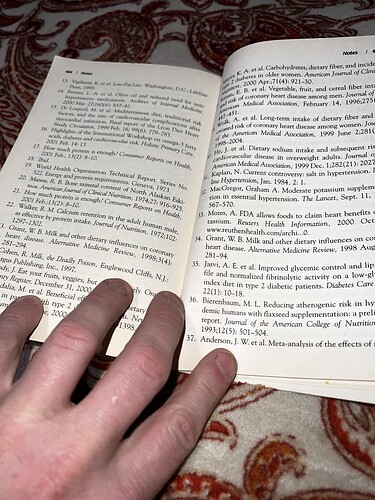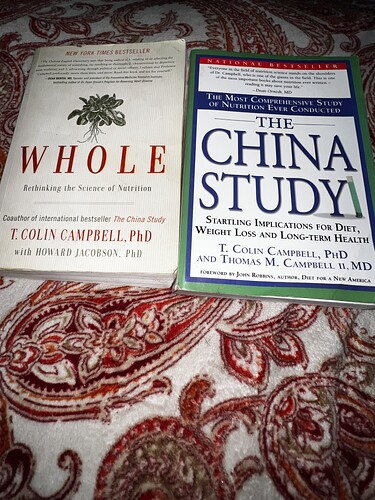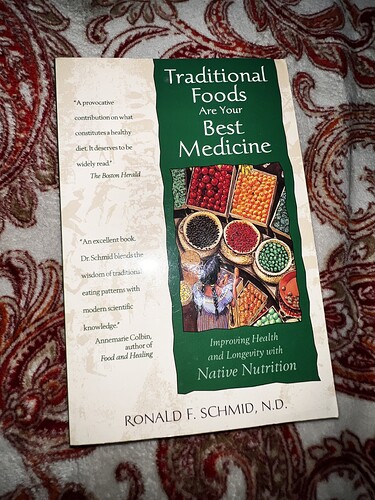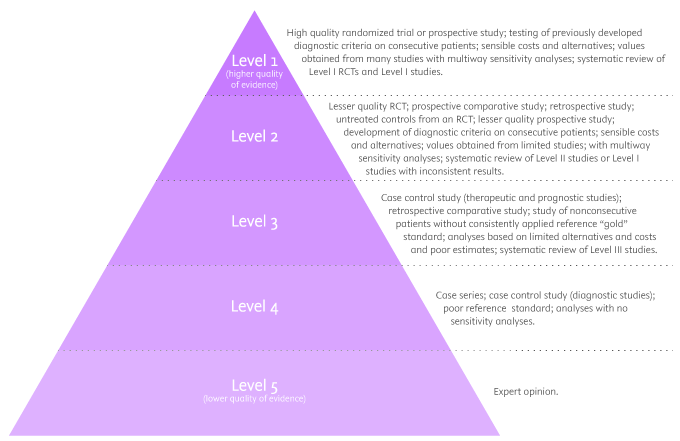Perhaps I am better qualified to state what do I live by. ![]()
We all, you and me, live by faith that our past experience will be a credible reflexion of things to come. Expect solid ground under your left foot that is in the air right now … faith in your eyes to show cars coming you way before crossing.
As for going to the doctor, considering I am married to one, that is most of the time not necessary for me.
However and since we are on the topic of “facts” academic in this case, tell me … how is your cholesterol?
(Rhetorical question, no need to answer. )
If it is high and you are worried and trust the “fact” that you need to get off saturated fats and statins to lower it, I have good news for you. Dietary fat does not go into your bloodstream, it is metabolised by your liver. Cholesterol is produced by your body to (among many other things) repair the damage done by sugar.
The “study” that demonstrates fat gets into the blood and forms plaque was done feeding pure cholesterol to rabbits (that are vegetarian and can not metabolise fat)
The demonisation of dietary cholesterol was a fabrication of Dr Ancel Keys and others, to shield the sugar industry from blame. The tobacco industry copied the sugar industry tactics to get out of the way too, aided by one of their lobby members. It worked for decades. The time for the sugar industry will come.
Meantime if you go to the cardiologist he will look at your blood work and ignore your sugar levels and focus on your LDL, pontificating you need to be on statins. Pfizer all happy.
Facts …
Those are at best half truths and misconceptions. Cholesterol metabolism is indeed more complex than simply treating a number, but high LDL cholesterol indeed leads to cardiac events, and statins lower that risk. statins these days are pretty much generic, and costs per month about what a cup of coffee at Starbucks runs.
Recent studies and not so recent that were suppressed for decades, demonstrate that sugar and not fat lead to cardiac events. In fact mortality is inversely proportional to cholesterol levels.
Google Dr Robert Lustig. (Pronounced Lustig as in Ludvig, not “Lastig”) Means happy in German ![]()
I give you a few links.
A good example of the need to be discerning in who you trust, and not depend on appeals to authority… I see that he has good work in glucose and fructose metabolism, and is a pediatric endocrinologist. But see no real expertise or research in lipids. He also has received a fair amount of criticism for some of his positions. One critical review: https://foodinsight.org/wp-content/uploads/2014/05/Dr-Kern-Review-of-Fat-Chance-2.pdf
To the point of this thread, it is a good example of how science should be open to new ideas and critical examination, the critics must also be subject to the same process, and use good science in their responses.
You seem to mix facts and interpretations based on hypotheses and theories in this matter. The measured cholesterol or sugar level in the blood is a fact, as is the number of cardiac events per time unit, etc.
If we think that there is a connection between the sugar or cholesterol levels and the probability of a cardiac event, that is not a fact, it is an interpretation or conclusion based on some hypotheses or theories. If the theory is replaced by another that can explain the facts better, the facts do not change, only the interpretation changes.
Although the scientific explanations are not facts, some theories are more believable than others. Usually, the theory that explains the facts best is the one that receives most support from scientists. If you think these scientists are wrong, you need an alternative theory that can explain the data as well or better than the prevailing theory. Otherwise it is very difficult to convince the scientists that the prevailing theory is wrong.
That’s not a fact. There are conclusions that lower LDL is better for your health, but those conclusions aren’t facts.
Like I said, what I hope people would have learned from high school science is the difference between conclusions and facts.
Thanks for making that connection for me! I should have guessed. My last PCR experiment was in undergrad. That is very cool.
We have come to this point because I challenged the validity of so called facts.The mention of the dietary fat fallacy, is just an example to illustrate that what we at some stage take as gospel (pun intended) can prove to turn quickly into an ugly machination with an even uglier agenda. .
The critic you link is a party interested in maintaining the status quo that has prevailed for the last 70 years, and made the fortune of the food and the pharmaceutical industry. Dietitian are indoctrinated from the start of their career to predicate that obesity is the fault of the individual. "Eat less and move more is the mantra. "
Regardless of opinions or semantics on what is a fact, when my illustration is fast becoming vox populi and is long out of the periphery and into mainstream, to challenge this fact is not the point.
I see with sadness a massive lack of humility in this discussion. Arrogance to claim who is a valid interlocutor and who is not, followed by intricate skirmishes on semantics or far fetched points of debate. Each participant trying to steer the attention on some puntual argument they think they can defend successfully.
The classic example of experts making nonsense claims like geocentrism and even heliocentrism should be enough to call for caution when claiming absolute knowledge.
Facts, ( something that is known to have happened or to exist, especially something for which proof exists, or about which there is information ) rely on what we know or was proven at some point in time. Is that set in stone? Really? think again, history is a long string of lies omissions falsehoods and contradictions, not enough to prop up a so called fact with any certainty.
Socrates of perhaps Plato, (who knows), tell it much better:
Scio me nihil scire
Sounds like you are deeply invested in your narrative. I only ask that you examine his statements based on principles of good science. You are free to believe whatever you wish, however.
Are you sure the author of that “review” uses good science? How do you know? Google? Dr Lustig, Dr Berry and about 20 more use good science and reach the opposing conclusion.
Of course I am free to believe what I want, and so are the others, including yourself. On this topic I intend to stimulate curiosity. On the present debate, I am disillusioned on the lack of mental flexibility. Then again, no skin off my nose.
Dietitians are not taught obesity is solely the cause of the individual. Clinical dieticians often have to work with people who have something medically complicating the process.
But in general, yeah…. If you find the average dude on the street who is morbidly obese and you have them reduce their calories by 500 calories or so a week until they are around 2,000 or so calories, and you have them lift weights consistently they will start to lose weight and get back into a healthier and more fit body. Now if that 2,000 calories
Is junk food, they will still lose weight but will develop other issues. Like bad body composition and so on.
But if you had them where 90% of their calories was fresh fruit, vegetables, beans, and cut out most sugary drinks like soda and so on, and develop an actual meal plan, they will most likely be healthier.
If I were to suddenly start eating an extra 750 calories a day of ice cream and soda, and fried cheese balls, and I reduced the time I spent hiking and working out significantly I would gain weight.
Most people, not all, but most people, who are morbidly overweight, tend to eat way too many calories and don’t consistently work out. Same with other animals too like cats. I have three cats. Two of them are normal healthy weight. One of them is a bit chubby. The chubby cat eats and eats. The other two like to nibble a bit, leave and come back to it. But now, they leave and the other cat would eat it. They thinned out a bit and the chubby cat, Ngipin, got bigger. So now I use a food puzzle to feed them. It takes Ngipin about 10x longer to eat the same amount of food. So she’s eating less, my other two cats also is eating from the food puzzles and so they nibble, leave and return. I take Ngipin for an extra 15 minutes a day into my bedroom without the other cats, and play with her using the laser light. She’s starting to move towards a healthier weight.
My brother has a lab and it stays mostly indoors. He has no doggy door because they don’t want their cat getting out of their house. So the dog gets let outside several times a day. They use to just leave tons of food in the bowl and she would over eat. She would still be let outside. But when they reduced the food, and started taking the dog on 2 30 minutes long walks and had their kids go outside and play ball with them, they also got in better shape.
Greetings, @Marc . Welcome to the Forum. I am interested in learning more about you and your background. I am a missionary kid who is now a 53 yo primary care provider in MIchigan. I was born and grew up in West Africa, and had a wonderful experience. That was not only with my godly parents, but also the large, multinational missionary group (our leaders are primarily Nigerian now, and they have varied from Canadian to US to Singaporean). The surrounding folks were 99% Muslim, and the very rural area we lived was typical–kind people who would ask how your family, work, and sleep went. @jpm is also a primary care provider. There are others on the Forum who do actual research in various areas of healthcare, including being part of those who have saved millions of lives through vaccines.
If you would like a write up of some of the studies behind heart disease, how statins work (very interestingly, more recently, the majority work by smoothing out the arteries, even independently of the cholesterol), I’m happy to send you some in a private message. The other factors that influence health, including being male/female, age, smoking, etc, are also fascinating. I’m by no means a researcher, but can provide some of the studies.
But, regardless, good to meet you.
Sincerely,
Randy
You are describing the prevailing hypothesis that has solved nothing and that does not work ever.
Yet we keep on repeating it.
I can not reply to your post point by point at risk of spending the morning typing.
I’ll give you a few of my thoughts however.
Before 1950, obesity, diabetes, cancer and heart desease were rare.
I am a Ww2 child and in my classroom of 43, we had ONE obese kid.
Look at your school photo and look at your kids or grandkids school photos.
What happened?
Sugar happened.
And the government telling us what is good for us happened.
Humans evolved for millions of years to present time status, 99% of the journey consuming exclusively FAT and MEAT. We are carnivores not omnivores. We eat vegetables and fruit at our own peril.
In our evolution journey, some hominids tried to go vegetarians. They went extinct. Egyptian consumed mainly weath and their life expectancy plummeted and desease was rampant.
Disclaimer: If you think the earth is 6000 years old and that God created us as we are today, you are welcome. Regardless, we got fat and sick in the last 70 years.
When it is possible for us to digest some carbs, we need to produce more insulin to counteract this. And it is excess insulin that gets us in trouble.
Carbs = sugar.
The concept of calories in human nutrition is another fallacy.
The idea of calorie in and calorie out may be a sound concept in thermodynamic and closed system. Our body is not closed, it is as open as it can be. So “calories” is a useless concept in human nutrition.
There are no essential nutrients in plant based food. In other words, nothing that plants provide is necessary for humans to live and thrive.
Yet food from animal sources is essential and can not be substituted with anything vegetable at risk of making us sick. look up margarine, seed oils, vegetable proteins etc, all industrial products, used once for lubrication or animal food, that after successful marketing is now in our food to boost the food industry profits.
If you are overweight or diabetic. If you have one of the many so called western civilization illness, I have one suggestion for you. Eat once a day and eat only animal products. Eat as much as you want, but only that and only once a day.
A few extra historical facts:
Ellen White, co founder of the 7DA church had a young secretary called JH Kellogg. He founded Kelloggs cereals with a specific thought in mind. To cure constipation and to cure masturbation.
I doubt there is one single food that has damaged humanity health more than sugar laced cereal.
There is a lot more to talk about, but if you are interested in being healthier, slimmer and free of unnecessary medications, you need to go to YouTube and look up Dr Ken D Berry. He has a YouTube channel that is full of good information on nutrition and how to avoid disease.
There are many more but he is a good start.
All the best
Marc
No. I’m not watching YouTube videos. I’ll stick to some of the books that was recommended to me when I took some courses in nutrition back when I wanted to become a dietician. Decided I did not enjoy working with clinically ill clients. I use to have about 30 books on nutrition but I donated the bulk to the local library. Their books has a nice set of references in the back.
There are some other books that was not part of the required reading but I still got because I really enjoyed it. I went through certification through E-Cornell and it really dug into these books. But Campbell was also associated with them so it make sense.
For fun, especially since I enjoy studying traditional cultures , though mostly myths, and I’m a big proponent of eating foods in their natural state I got this book as well. I enjoyed it, but did not necessarily believe everything claimed in it. Nonetheless I do believe that eating healthy and staying active should be our first stance for preventive care.
I personally do intermittent fasting but it’s because I don’t like working on a full stomach and so I eat little or not breakfast or lunch. Though lately it’s more of a light lunch and a medium dinner followed by a shake.
As for eating just some kind of carnivore paleo diet…. Definitely not going to. Not only do I find it disgustingly unethical but it’s also a very tasteless burning unhealthy approach to cooking and food and it’s just not heavily supported scientifically. For a fact when you look at groups like “American heart association” they tend to heavily push a diet high in wholesome plant foods.
This article by PNAS does not seem to support some of what you said.
https://www.pnas.org/doi/full/10.1073/pnas.2115540119
Humans can and do thrive on a vegan diet. I’ve been one for over 15 years including my time in the army. I’m not on medications. I take algae pills for omegas. I hike and forage for wild foods weekly. I’m not going to post my pics here, but some have seen me and know I’m not scrawny and malnutrition.
Hi Skovand, is that your name?
Yes, nutrition is an interesting topic. A pity that it has been corrupted by commercial and political interest.
Your books are from the eighties, a lot of water has passed under the bridge since then.
That particular author appears to have been on “alternative medicine”, promoting “natural” supplements (made in a factory). As far as obesity, does not seem to have done much good for himself judging from the photos I found.
In medicine when a new discovery is made, it takes about 17 years to get into doctor’s practices. MD all repeat what they learned in University, and are extremely reluctant to get up to date. Universities are even slower. I wouldn’t be surprised if some doctor still consults those books that belong in a museum.
Since you like reading from books, I do so myself, let me suggest a few that you may enjoy.
Lies my doctor told me:
The big fat surprise
" Metabolical" a play of words between metabolic and diabolical.
The veegetarian myth
"You have been lied to about Cholesterol and heart disease
https://www.youtube.com/watch?v=08gQrUAZSaE
Dr Zoe Harcombe. The obesity epidemic, what caused it, how can we stop it?
https://youtu.be/tPjKJfajhAw
There are many more authors who dedicated decades of their professional life to reverse the damage done by industry and politics. Once you get to read a few of this books, you will search and find more authors interested in the truth of what constitutes true human food.
I wish you all the best.
Marc
PS
My links are for Amazon Australia. Make sure you go to Amazon.com if you live in the US
Hooroo
M
And just to stay on topic, this shows how there are true facts and also fake facts … and some in between too. ![]()
Yes the last book is from an alternative person, which is why I mentioned it was not required reading, and that I did not think most of it was legitimate.
The Whitaker books came out in 2002, and I was 17 in 2007 when I started going to college the summer I graduated high school.
Yes. Some things have changed but not that much. There was definitely not a complete overhaul and the e-courses I took with Cornell was in 2017 I think. They still referred back to these books even then.
The study I showed is from the last few years. All the science involved is moving more towards a diet higher in plant based foods being healthy and further from diets , and to be honest the carnivore diet was only ever a fat loss fad that was unrelated to health.
Your body uses proteins, carbohydrates an fats all mostly the same way, regardless of where it came from. It does not really use complete proteins but breaks them down into amino acids and so on. Then it builds from those what it needs and uses calories in the process.
Also not all cholesterol is the same. Sometimes headliners show something like higher levels of cholesterol is good, but it’s usually referring to the cholesterol serum that your body naturally produces without consuming any from your diet. Or it may be referring to VLDL traveling in the bloodstream at higher rates does not cause any more damage.
That’s from Harvard Medical recently.
It talks a bit about the debate over consuming cholesterol vs saturated fats.
Sometimes there are good videos on YouTube by legitimate doctors that are educating the public following the general consensus of the experts. But often, it’s fringe “experts” who are similar to conspiracy theorist in how they share info and in what they share.
But I’ll check your book list. I still enjoy dietetics and books on nutrition.
Anyways, just got back from the gym. I go every day , well Monday-Saturday typically at 230am.
You’re right. It’s often folks who operate beyond their expertise, are rejected by the science, who take to the Internet for You Tube. That’s because they apply to people with little scientific backing.
@Marc, neat that you live in Australia. Quite a few missionaries in my growing up came from Australia. I think that you have a lot to teach me.
Regarding Ken Berry, he is a family doc. Phil and I are both MD family docs, as well. In my very standard med school, we got about 6 hours of nutritional training. Berry should know better, and rely on the standardized sciences. I asked my own primary care doc to send me to the local nutrition scientist, to teach me more about healthy lifestyle and eating. There is a lot I need to learn–and I have to go to the right, scientific sources.
Typically, docs like him rely on testimony, which is highly dependent on confirmation bias. Nutrition studies are particularly hard to do good science on, because it’s so hard to standardize our diets. I looked at his website, and found no evidence at all, other than his personal testimony.
Testimonials feel great, but are the lowest level.
Here’s a diagram that helps me.
Blessings.
Randy
Levels of evidence in research | Elsevier Author Services
Cochrane.org is a great resource for review studies.
It is interesting how a new round of diet/nutrition books come out every 5-10 years and get popular press, only to fail into obscurity with time. Nutrition is a huge industry, and one that depends on book sales and often supplement sales to the gullible and desperate. Nutrition science, in contrast, is hard to do in humans, due to all the confounding factors and ethical issues. Genetics, environment, lifestyle, and cultural issues all play a role.
Why are you referring to facts?
You have spent this entire thread attempting to tell us to just ignore facts, to not be curious. Everything is relative and nothing is true, at least that is the impression you have been giving.
So do you now think applying the scientific method and facts is worth doing?



